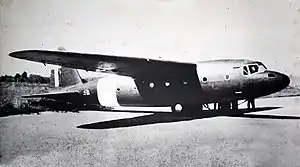| AL-12P | |
|---|---|
 | |
| Role | Transport glider |
| National origin | Italy |
| Manufacturer | Aeronautica Lombarda |
| Designer | A. Ambrosini |
| First flight | 1943 |
| Primary user | Italian Army |
| Number built | 16 |
The Aeronautica Lombarda AL-12P (also known as the Ambrosini AL-12P) was a Second World War Italian transport glider built by the Aeronautica Lombarda for the Italian Army.[1]
Design and development

The AL-12P was designed by A. Ambrosini and was a high-wing cantilever monoplane with a wood-ribbed fuselage covered with stressed molded plywood.[1] Its wing had a foliated spruce plywood spar and was covered with plywood although the ailerons were fabric covered.[1] It also had large slotted spoilers that could be opened perpendicular above and below the wing.[1] The pilot and co-pilot sat side by side in the nose which is made from plywood-covered welded steel tubes and was hinged to allow cargo to be loaded into the fuselage, a passenger door was fitted on the right hand side of the fuselage.[1] It could carry 12 fully equipped troops or the equivalent weight in equipment.[1] The company built 16 AL-12Ps for the Italian Army.[1]
Ambrosini P.512

After World War II, S.A.I.-Ambrosini modified at least one AL-12P to be powered by 2 × 167.78 kW (225 hp) Alfa Romeo 115ter six-cylinder air-cooled engines and fitted with a revised undercarriage with shock absorber struts attached to the engine nacelles braced by V-struts from the fuselage sides.[2]
Specifications (AL-12P / P.512)
General characteristics
- Crew: 2 (pilot, co-pilot)
- Capacity: 12 fully equipped troops, (P.512) 1,600 kg (3,527 lb)
- Length: 14.02 m (46 ft 0 in)
- Wingspan: 21.34 m (70 ft 0 in)
- Height: 3.4 m (11 ft)
- Wing area: 50.7 m2 (546 sq ft)
- Empty weight: 1,588 kg (3,500 lb) , (P.512) 2,000 kg (4,410 lb)
- Gross weight: 2,812 kg (6,200 lb) , (P.512) 3,600 kg (7,937 lb)
- Powerplant: 2 × Alfa Romeo 115ter 6-cyl. inverted in-line air-cooled piston engines, 168 kW (225 hp) each (P.512)
- Propellers: 2-bladed metal variable-pitch propellers
Performance
- Maximum speed: 249 km/h (155 mph, 135 kn) (P.512)
- Cruise speed: 230 km/h (143 mph, 124 kn) (P.512)
- Minimum control speed: 85 km/h (53 mph, 46 kn) (P.512) with flaps, (P.512) without flaps 97 km/h; 52 kn (60 mph)
- Range: 500 km (310 mi, 270 nmi) (P.512) with a payload of 1,275 kg (2,810 lb), (P.512) 499 km; 269 nmi (310 mi) with a payload of 748 kg (1,650 lb)
1,240 miles.
- Service ceiling: 2,100 m (6,900 ft) (P.512) on one engine
- Rate of climb: 4.9 m/s (970 ft/min) (P.512)
- Wing loading: 71 kg/m2 (14.5 lb/sq ft) (P.512)
- Power/mass: 0.09 kW/kg (0.057 hp/lb) (P.512)
See also
References
Note
- 1 2 3 4 5 6 7 8 Mrazek, James E. (2011). Airborne Combat - The Glider War/Fighting Gliders of WWII. Mechanicsburg, Pennsylvania, United States: Stackpole Books. ISBN 978-0-8117-0808-1.
- 1 2 Green, William (11 November 1948). "Italian Freighter: The S.A.I. - Ambrosini P.512 Twin". Flight: 570. Retrieved 30 March 2013.
Bibliography
- Mrazek, James E. (2011). Airborne Combat - The Glider War/Fighting Gliders of WWII. Mechanicsburg, Pennsylvania, United States: Stackpole Books. ISBN 978-0-8117-0808-1.
- Green, William (11 November 1948). "Italian Freighter: The S.A.I. - Ambrosini P.512 Twin". Flight: 570. Retrieved 30 March 2013.